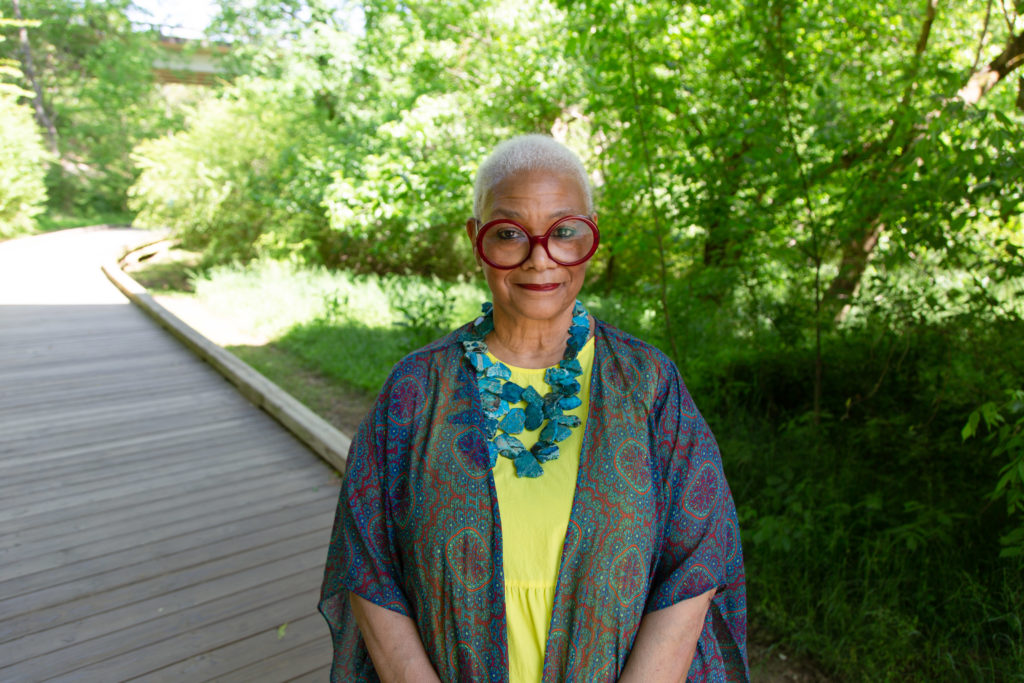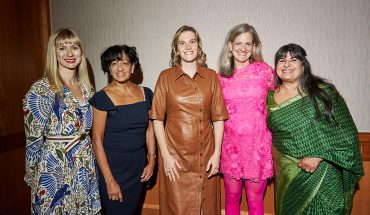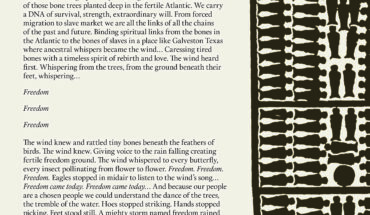North Carolina’s Poet Laureate talks about balancing creativity and professional success.
As told to Ayn-Monique Klahre
This September, WALTER will host its annual WINnovation summit, which focuses on women in leadership roles. One of our speakers will be Jaki Shelton Green, an award-winning writer and poet, and North Carolina’s Poet Laureate. In this role, she sees herself as both an ambassador for creative writing for people from all walks of life and a mentor for young writers as they begin their career paths. Here, we learn how she balances creativity with professional success.

You have been a working poet for decades now. Has it been hard making a living as a creative?
For me, it has been a journey with balance. I’m grateful that many years ago, when I was starting out professionally, I had guides who taught me the importance of time management, of being organized and being strategic. I’m a creative who believes in natural, organic, not-contrived flow, but I’m also a mom of adult children, I’m a grandmother, we’re great-grandparents. I’m a wife. My 105-year-old mother lives with us, so even though she is in excellent shape, we are care providers for an elder. So there is certainly the due diligence of trying to stay free and urgent inside all of that management.
So how do you “do it all”?
I’ve always had that balance of making sure that, while I’m out there constantly, while the outpourings of the external drive are so activated and ramped up, I’m still making space for creativity. Right now in my role as poet laureate, the creativity is in how I’m executing the laureateship. When I write, I’m writing. I’m very deliberate about protecting that space.
When my children were growing up, we had a system: during the week, I was the super mom. But my kids and I had the agreement that Saturdays belong to Mom up until about 1 or 2pm. You do not knock on the door if I’m working in the bedroom or study. You do not come near the door. The rest of the day, the weekend, the week is yours. So I had a rhythm and they supported that rhythm.
I also try to separate the work from my personal work. The entire time I’ve been poet laureate, I’ve continued to teach my classes. That has been a major time commitment. When people ask, how do you do it all? Well, sometimes I’m up at 4am at some no-name hotel grading papers and writing feedback to the students.
But I’ve been blessed that I’ve created systems and that I have partners who support that flow. That’s how I’ve functioned for years.
Everyone has their own bag of tricks. In my own way, I’m very strategic. I’m sitting now in a space that we created for me; it’s a huge sun room that’s also my office. Sometimes we entertain in the sunroom, but during the day, it’s where I work. I just knock out work. My husband is gracious, he brings me tea or water or a smoothie, he makes sure I have what I need.
I have myself calendarized in terms of time. I’m a task lister, I’m a person who makes all the notes. I’ve thought about having a class on to-do notes. I’m fascinated when I find someone’s to-do list in a grocery cart. I can read their list and know they have cats, or that they have an elder or children. Even if I just read, pick up Scott at 4 instead of 5 today for soccer, I like to think about it. And I have to have that grid for my own sanity.
Have you always been that way?
As a young writer I was just all over the place. I’ve learned how to not give too much of myself away. We can bankrupt our creativity and our health really quickly. In my field, as in your field, everything is going out but very little is coming back. When we’re not managing the work, we’re managing our personal lives.
What I get out of it is, when I’m teaching any class, whoever the students are, I learn when I teach. That in itself is a blessing and a huge reward. But the energy I expend — people say, you travel all the time, you’re here and there and hobnobbing — but even before that there’s preparation for the speech, there’s preparations for a two-week residency in a county four hours away. That includes being strategic about packing!
I’ve been saying since being the laureate, I need my people. My husband is good, my daughters are good — especially for a big fancy thing, like when I had to fly to Cincinnati for a body of work I’ve been commissioned to do for the orchestra, which premiered last spring. I was like, OMG, I need a formal dress, what am I gonna wear? And my daughters helped me with that.
What are your responsibilities as the Poet Laureate?
Like many laureateships, it’s designed by the poet laureate. I don’t have any mandates from the state. I can be as creative and innovative as I want to be. But when I was appointed the laureate, I wanted it to be comprehensive. It’s an ambassadorship for all the people, and all the people are different!
I don’t have a cookie-cutter workshop. When I’m invited to eastern North Carolina, I’ll know, this is a rural school, I’ve done my research. I’m looking at where the focus is. A group of women writers in the mountains might be different than a group in the Triangle. I take it really seriously. The word ‘ambassador’ implies going out into the world and doing the work. Hopefully we are getting people excited about poetry, we are inviting people in different communities to write and comment on their lives, to have a different experience with poetry than maybe my generation did. I’m in rooms a lot where people say, in high school I read the classics and I just couldn’t relate.
So we’re keeping it fresh. I’m paying attention to the world of poetry and bringing it out into the world, teaching people that creative writing is therapeutic, that it’s part of a rich landscape of medicine. I may have made it more complicated for myself in terms of the schedule, but I’m happy to visit these nooks and crannies of North Carolina that I’ve never heard of before. I’m working with young people who don’t have an arts education program in their school. As rich as North Carolina is, there are still a lot of gaps. I’m trying to have a presence in those liminal spaces.
What do you like about the role?
In addition to what people see — the photos of me at functions or speaking — people don’t see the number of emerging writers, young writers, women writers, who are having lunch at my house. As an elder I take my responsibility seriously. My role right now is to get out of the way, to provide answers to the questions, or to give direction to the questions I’m asked. We have a fabulous new generation emerging in the literary arts. I celebrate my own voice, but at this time of my life, I also want to celebrate what’s coming. I’m already here, I want to support who’s next. The work across generations is so important.
What’s different with the new generation?
It’s a different world altogether, very technical. I still hold true to how I began, I still use line paper. I should have stock in legal pads! There’s where I write, when I sit down with the legal pad. Then I put everything into the computer. If I’m on the computer composing, my brain wants to be the editor. But when I’m writing, I just let it rip — the page is all scratched up, there are notes in the margins. That’s where the magic happens.
This interview was lightly edited and condensed for clarity.
This article was originally published on waltermagazine.com on August 8, 2022.




